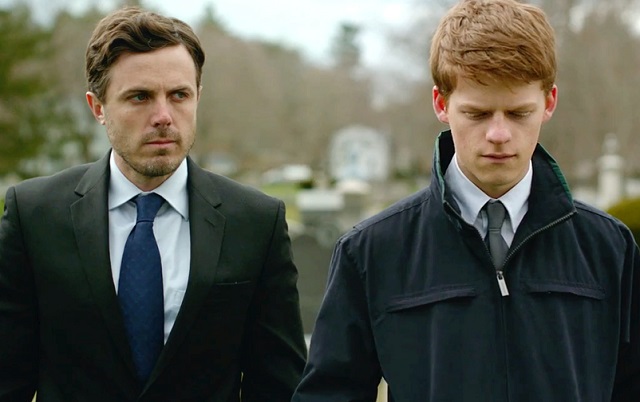Don’t avoid Manchester by the Sea because you think it’ll be too sad. You’ll deprive yourself of one of 2016’s best movies.
Perhaps you’ve heard that Manchester By the Sea is a really sad, bleak movie. This time of year, we get those types of films, the heavy dramas that feel meaningful and will surely get plenty of love at the Golden Globes and Academy Awards.
No, they’re not the movies that everyone will see, which is a big reason why a lot of people don’t care about the Oscars. But many of them had an impact. You may never watch Schindler’s List or 12 Years a Slave again, or at least not for a long time, but those films are significant. (And that shouldn’t be confused with movies that act like they’re important, such as 2004’s Crash, which may be one of the worst Best Picture winners ever. But that’s a column for another time.)
But don’t dismiss Manchester by the Sea because you think it will be a major bummer, something that will be impossible to enjoy. No, you probably won’t be smiling as the credits roll and you’re leaving the theater. You’re not going to be talking about that one cool scene. You likely won’t feel like you immediately need to see the movie again.
However, this film is not just some bleak slog with great acting that reminds you how terrible life can be. It’s a funny movie in many places. You’ll probably be surprised how often you laugh while watching this movie, despite its subject matter.
Ian at the Movies
- Borg vs. McEnroe is surprisingly good, portraying two tennis icons not as different as believed
- Rampage works because it doesn’t try to adapt the video game
- Why Tomb Raider and Alicia Vikander break the bad video game movie trend
- Game Night uses all its pieces well, notably Rachel McAdams, for a twisty story full of laughs
- Black Panther is like no other Marvel film, reaching a higher bar as a result: 5 takeaways
Telling jokes, making wise-ass remarks, expressing sarcasm (sometimes laced with bitterness), pointing out the absurdity of situations that life presents and the entanglements they cause, is often how we get through life. Because it can be too much to bear at times without some humor to lighten things up. That humor doesn’t always come from jokes, either. It’s how we react to circumstances and events. It’s an inappropriate remark, perhaps one that catches someone off guard.
Lonergan gets this in the scenes he creates and the dialogue he builds between characters in his stories. Sure, some of the conversations can have sharper quips and better timing than would actually happen in real life for the sake of comedy and drama. Yet the interaction between his characters feels real because they’re not just bantering back and forth. They’re dealing with difficult subjects. Sometimes, there’s more in what isn’t being said than what is actually being articulated.
It certainly helps when excellent actors are bringing those conversations and situations to life. Casey Affleck has been doing fine work in a variety of films — some good, some mediocre — for the past 15 years (though 2007 was a particularly good year for him with Ocean’s Eleven, Gone Baby Gone, and The Assassination of Jesse James). But he’s never been better than he is here as Lee Chandler.
When we’re introduced to him, Lee seems to be a man content to live a quiet, simple life as an apartment building custodian in Boston. Of course, you’re dealing with the worst of people in some regard with that occupation. Tenants only call you when something goes wrong. Even if they try to be genial and engage in conversation, you’re fixing their sink, repairing their furnace or unclogging shit from their toilet.
Naturally, if the problem that needs fixing is a difficult one, people get testy and that causes tension. As a result, we learn that Lee has something of a temper. Or at least he’s doesn’t always consider what the best thing is to say in particular situations. But that just means he’s not as simple as his occupation and demeanor might indicate. He has his breaking point, just like anyone else would.
As it turns out, that may be what Manchester by the Sea is really about. Just how much can one person take before it becomes too much to deal with? And when pushed to that point, how will you cope with such circumstances?
Lee’s family is in Manchester, notably his older brother Joe (Kyle Chandler) and nephew Patrick (Lucas Hedges). So why doesn’t he live there? Nothing appears to be keeping him in Boston. He doesn’t have a family, girlfriend or any friends, apparently. He has his job and lives in the small basement efficiency that comes with it. Yet circumstances eventually pull Lee back to Manchester. His brother has died after finally succumbing to congestive heart failure, and Lee is the one who has to put all of his affairs in order.
But Lee doesn’t just have to deal with funeral arrangements or outstanding obligations left behind by Joe. Patrick is a 16-year-old kid who now doesn’t have a father. His alcoholic mother has been out of the picture for years, and his next closest relatives live in Minnesota. Though the solution seems rather obvious, Lee seems to be in denial. He’s the one who has to take care of Patrick. That’s how his brother wanted it. Knowing he was in poor health, Joe set things up financially and logistically to make it easier for Lee to move back to Manchester.
So why can’t he just move back? He has nothing in Boston and is close with his nephew. He also seems to be very much at home in Manchester, familiar with everything and able to slip back in comfortably. But maybe it’s not that comfortable. Lee left Manchester for a reason and it’s devastating, more than anyone should have to live with. It might be more than anybody could live with. It’s made Lee something of an infamous urban legend in his hometown, unfortunately, and his reputation as a hothead also precedes him.
The longer Lee stays in Manchester to manage his brother’s affairs and help Patrick maintain as normal a life as possible, the more difficult it becomes to avoid the life he fled. His ex-wife (Michelle Williams) still lives in the area and the thing that is almost too much for Lee to live with is what drove them apart. Yet what remains of their relationship seems cordial. There’s no tension between them, other than what can’t be spoken. Though she’s moved on with her life, she still loves Lee. But he just can’t allow himself to be in her life, or to have her in his life. It’s too painful.
Above all, Lee won’t forgive himself, nor does he think he should be forgiven. He moved to Boston not just to get away from the pain, but to punish himself. He doesn’t believe he deserves anything more, though his brother never stopped loving and supporting him. Though Lee has tried to keep his family at a distance, it’s the one that still gives his life meaning. But is he in a place where he’s capable of being Patrick’s guardian for the next two years? And if not, does he even have the right to try?
What Manchester by the Sea gets so right, what feels so authentic, is that there’s no one right way in dealing with tragedy. There can be wrong ways to react, but people — especially family and friends — generally understand how difficult it is to navigate such territory. Even when you try to push people away to cope in your own way with problems that just seem too big, you do need something to lean on. And no one can be more of an anchor than family, even if it might feel like it sometimes weighs you down.
This isn’t a perfect film. Many people will not like how it ends, not necessarily because of what happens, but because of what doesn’t. It’s possible that Lonergan didn’t quite know what else to do once Lee’s primary dilemma is resolved and he makes the best decision, even if it’s one not everyone agrees with.
Yet that ending doesn’t ruin the film. Though it may not feel that way at the time, I’d argue it enhances the experience. It’s one that makes you think about what might happen next, along with everything that happened before it. It’s an ending that may compel you to talk about it with whomever sees the film with you or anyone else you know who’s watched it. Maybe you would have ended it differently or wanted to see something different. And that adds to the experience. It makes Manchester by the Sea resonate. And that’s why it’s one of the year’s best films.






Great acting… hahaha it was crap.